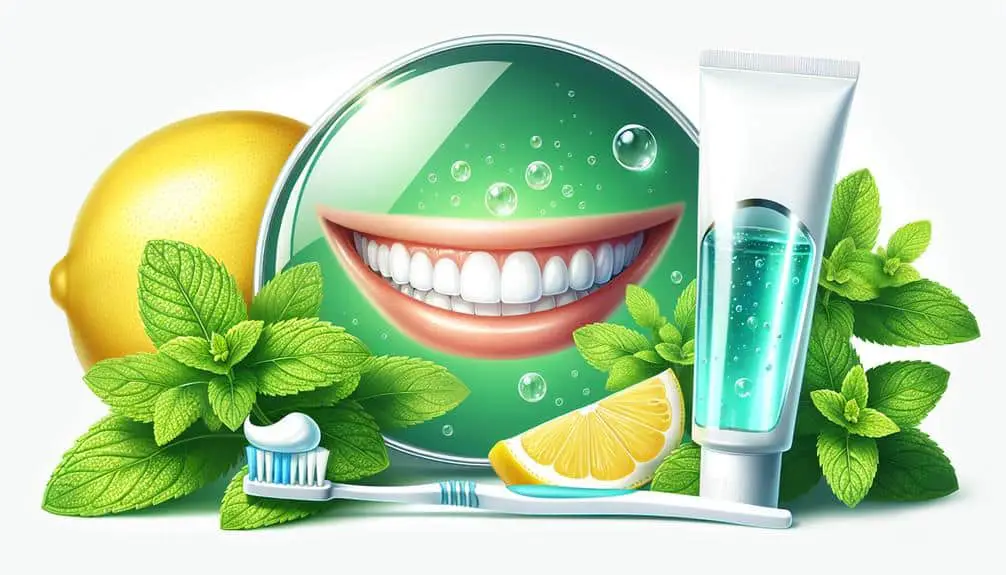To guarantee effective teeth whitening gel, make sure it contains hydrogen peroxide to break down stains, carbamide peroxide for a gradual release of whitening agent, baking soda to remove surface stains and freshen breath, coconut oil with antibacterial properties for oral health, and activated charcoal to bind to stains and toxins. Each ingredient plays a unique role in brightening your smile and promoting dental health.
Key Points
- Hydrogen Peroxide: Powerful bleaching agent breaking down teeth stains, follow safety precautions.
- Carbamide Peroxide: Slower release of whitening agent, penetrates enamel effectively.
- Baking Soda: Abrasive, neutralizes acids, antibacterial, safe when used correctly.
- Coconut Oil: Contains antimicrobial properties, supports gum health, effective in DIY treatments.
- Activated Charcoal: Binds to stains, aids in removal of discoloration, noticeable results with regular use.
Hydrogen Peroxide
To effectively whiten teeth, hydrogen peroxide is the primary active ingredient in many teeth whitening gels. Hydrogen peroxide is a powerful bleaching agent that works by breaking down stains on the surface of the teeth, resulting in a brighter smile. When using hydrogen peroxide for teeth whitening, it's essential to follow safety precautions to prevent any potential harm to the gums or mouth tissues. Professional advice is recommended before starting any teeth whitening regimen to guarantee proper usage and minimize the risk of adverse effects.
When using hydrogen peroxide-based teeth whitening products, it's vital to follow the instructions provided by the manufacturer carefully. This includes the recommended duration of use, frequency of application, and proper storage of the product. It's also advisable to consult with a dentist before beginning any teeth whitening treatment to address any underlying dental issues that may affect the whitening process. By following professional advice and safety precautions, you can effectively use hydrogen peroxide for teeth whitening while minimizing the risk of complications.
Carbamide Peroxide
Carbamide peroxide serves as another common active ingredient in teeth whitening gels, effectively aiding in the whitening process by breaking down stains and discoloration on the tooth surface. This compound is a combination of urea and hydrogen peroxide, which allows for a slower release of hydrogen peroxide compared to its counterpart, hydrogen peroxide. The effectiveness of carbamide peroxide in teeth whitening is attributed to its ability to penetrate the enamel and dentin layers, targeting and oxidizing the colored molecules that cause staining.
When used as directed, carbamide peroxide is generally considered safe for teeth whitening purposes. However, it's crucial to adhere to the recommended guidelines provided by the product manufacturer or dental professional to prevent potential side effects such as tooth sensitivity or gum irritation. Additionally, consulting with a dentist before starting any teeth whitening treatment is advisable to ascertain it's suitable for your dental health. Overall, carbamide peroxide is a valuable ingredient in teeth whitening gels, offering both effectiveness and safety when used correctly.
Baking Soda
A significant component often utilized in teeth whitening gels is baking soda due to its abrasive properties that aid in removing surface stains from the teeth. Baking soda, or sodium bicarbonate, offers several benefits for teeth whitening:
- Effective Stain Removal: Baking soda's abrasiveness helps scrub away surface stains on the teeth, revealing a brighter smile.
- Neutralizes Acids: Baking soda can help neutralize acids in the mouth, which may contribute to tooth discoloration.
- Antibacterial Properties: It possesses antibacterial properties that can help reduce harmful bacteria in the mouth, promoting better oral health.
- Freshens Breath: Baking soda can also help freshen breath by neutralizing odors and creating a less hospitable environment for odor-causing bacteria.
Despite its benefits, some myths surround baking soda, such as it being too abrasive for teeth or causing enamel damage. When used correctly and in moderation, baking soda can be a safe and effective ingredient in teeth whitening products.
Coconut Oil
With its growing popularity in oral care products, coconut oil has emerged as a promising ingredient for teeth whitening gels due to its unique properties and potential benefits. Coconut oil is commonly used in a practice known as oil pulling, where swishing oil around in your mouth helps remove bacteria and debris that can contribute to discoloration. This process can help whiten teeth and promote overall oral health.
The benefits of coconut oil for teeth whitening extend beyond just its cleansing properties. Coconut oil contains lauric acid, which has antimicrobial properties that can help combat harmful bacteria in the mouth. Additionally, the fatty acids present in coconut oil can help reduce inflammation and support gum health, contributing to a brighter smile.
For those interested in DIY recipes and techniques, coconut oil can be easily incorporated into homemade teeth whitening treatments. Mixing coconut oil with other natural ingredients like baking soda or essential oils can enhance its whitening effects while providing a fresh and pleasant taste. Experimenting with different combinations can help you find the perfect homemade teeth whitening solution that works for you.
Activated Charcoal
Coconut oil's effectiveness in teeth whitening has paved the way for exploring another promising ingredient, activated charcoal, known for its potential to enhance the whitening properties of oral care products. Activated charcoal is a highly porous substance that binds to toxins and stains on the teeth, aiding in the removal of surface discoloration. When used in teeth whitening gels, activated charcoal can help achieve a brighter smile.
Here are some essential points to contemplate when using activated charcoal for teeth whitening:
- Application Techniques: To use activated charcoal effectively, mix a small amount with water to form a paste. Gently brush this paste onto your teeth, ensuring even coverage. Leave it on for a few minutes before rinsing thoroughly.
- Benefits: Activated charcoal can help remove stubborn stains from the teeth, resulting in a brighter smile over time.
- Safety Precautions: While activated charcoal is generally safe for most people, it's abrasive and should be used cautiously to avoid enamel damage.
- Results: Regular use of activated charcoal in teeth whitening routines may lead to noticeable improvements in tooth color and overall appearance.
Frequently Asked Questions
Are There Any Side Effects or Risks Associated With Using Teeth Whitening Gels Containing Hydrogen Peroxide?
When using teeth whitening gels with hydrogen peroxide, be aware of potential risks like tooth sensitivity and gum irritation. Precautions include following instructions carefully and consulting a dentist. Despite risks, such gels are effective for whitening teeth.
How Long Does It Typically Take to See Noticeable Results From Using a Teeth Whitening Gel With Carbamide Peroxide?
To see noticeable results from a teeth whitening gel with carbamide peroxide, it typically takes about 1-2 weeks of consistent use. Following proper application techniques, like evenly coating teeth, can enhance product effectiveness and speed up results.
Can Baking Soda Cause Sensitivity or Damage to the Enamel When Used as a Teeth Whitening Ingredient?
When using baking soda as a teeth whitening ingredient, it's important to take into account potential enamel safety risks and sensitivity issues. While effective in removing surface stains, excessive use can result in enamel damage and heightened sensitivity.
What Is the Recommended Frequency for Using Coconut Oil as a Teeth Whitening Treatment?
For effective teeth whitening, using coconut oil can be beneficial. The recommended frequency is daily or a few times a week. While coconut oil can help with stains, it may not provide immediate results like other treatments.
Is Activated Charcoal Safe to Use for Teeth Whitening, and Are There Any Potential Long-Term Effects to Be Aware Of?
Like a gentle breeze, activated charcoal for teeth whitening can be safe when used properly. However, long-term effects are still debated. Safety concerns include enamel damage and potential interactions with medications. Consult your dentist for guidance.



